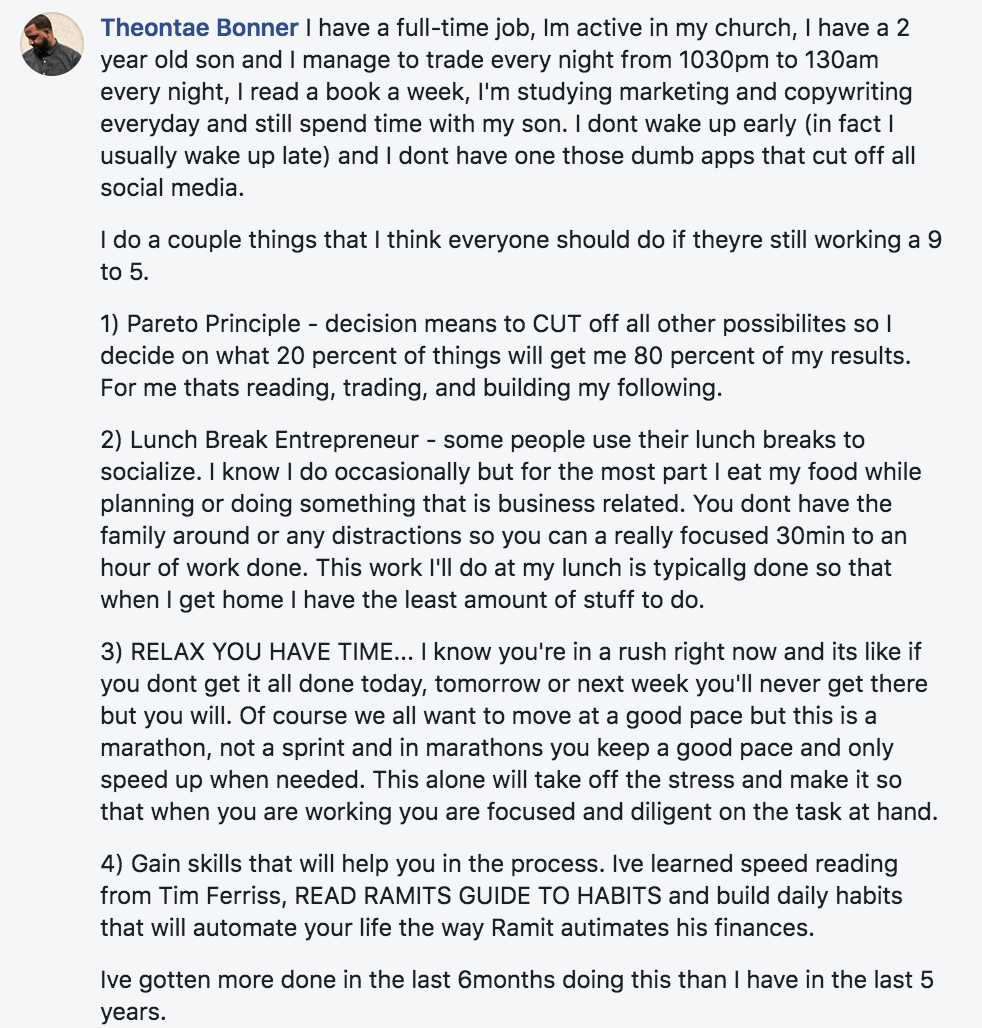
10 ways to start a business when you don’t have enough time
There’s a Catch-22 you’ll face while beginning your entrepreneurial journey: You’re partly starting a business for greater control over your time and energy. But until you get it up and running, you’ll have to … surrender control of your time and energy.
As a founder, you must complete the high-wire act of working on your business in the gaps of your normal working life, doing research and product development on lunch breaks, between soccer practice, and whenever else you can grab the time.
So how can you keep your business growing while not collapsing from being so exhausted all the time?
There’s no easy solution. And yet, we see thousands of people start businesses every year. So how do they do it? We asked you guys, our readers, and gathered 10 of the best pieces of advice.
***
Note: Some comments lightly edited for grammar, spelling, and length.
1. Wake up early
This was by far the most popular suggestion. If you “treat yourself” at the end of each day by staying up late and relaxing, a suggestion: treat yourself to some sleep instead — and then wake up earlier.
From reader Stephen Fiser:
For me at least part of the equation has always been getting up super early. When I had a corporate job I was getting up and working on side projects at 5 a.m.
To make that easier, I’ve always had to make a short list of exactly what to do when I wake up. If I don’t do that, I go straight back to bed.

2. Eliminate time wasters systematically
Feeling overwhelmed is usually traced back to an inability to ask for help or say “no.” So get real about what you spend your time on, and eliminate the stuff that doesn’t give you energy.
From Sin Declerc:
I made a list of all things that demanded energy. Going from doing the dishes to listening to nagging people to being stressed out by all those magazines I should read but never seem to find the time to do so.
In phase 2, I drew a line next to this list, and I wrote down the best strategy I could think of to eliminate these energy killers.
In phase 3, I did one to three things of that list for about two weeks.
It created emotional breathing space. It won’t help for finding time, but it will help on getting the mental space.
3. Focus on one thing each day
When you start a business you’ll be tempted by marketing plans, research, books to read, logos to make … stop. No matter where you are in your business, there’s one task that will lead to growth. And oftentimes, you know what that one thing is.
From Norman Horn:
I focus on ONE THING I can do that pushes my consulting business forward every day. Then one of two things happens: either I complete the thing and I’m satisfied, or I let it steamroll into additional actions and build momentum. But it has to start with one clear goal for the evening, or else nothing will get done.

4. Only move 1-3 tasks forward a day. That’s it
A sprawling daily to-do list means you’ll never make progress. Pare it down, one day at a time.
From Hannah E. Christian:
I, too, get up super early because I have 3 small kids, but I’ve learned that the key is 1-3 TASKS get done per day.
Tasks are not ideas. Ideas multiply like rabbits and steer you off course at times. Tasks are concrete things like “write 1500 words on a topic.”
So…
I get up early. Drink my coffee and read.
Exercise.
Do my three tasks.Rinse.
5. Surrender your week, embrace weekends
A lot of time management will focus on optimizing these tiny windows of time between tasks. But that’s not where deep work occurs. So try letting your week sail by as normal but get serious on the weekends.
From Alex Johnson:
For me, it was finally realizing that it didn’t matter what hack or system or tactic I tried using — I just didn’t feel like waking up super early during the week before work or staying up super late on a work night.
Wound up deciding that I’d just carve out five hours on my calendar on Saturday mornings and three hours on Sunday mornings (and aggressively protect that time on my calendar), and just not feel guilty about trying to force it into the work week. Took a bit to adjust to not feeling guilty during the week, but ultimately worked SO much better for me.
6. Put it on your calendar and protect it
If you don’t block out time for important things, you’ll let other less important tasks fill your day.
From Wayne Werner:
What I’m in the process of discovering is that time unscheduled is time wasted. Because if I don’t require myself to write for <X> minutes a week, then I won’t write.
7. Make it public
It’s hard to skip a task when you know some public shame is coming your way.
From Anish Raju:
The one that has worked well for me, for big goals, is setting a date deadline and making it public to family, friends, clients, coaches, etc. So I have gotten to multiple milestones by announcing a date that tricks me into having to work hard and meet that damn deadline. And, most importantly, I find I can only work at one big goal at a time, to be effective. I have a full-time job and two kids.

8. Take what you can get
Recognize you’ll never have the perfect schedule or system. What’s important is any progress on the things that matter.
From Shirley Tse:
I block work time on my calendar even if it’s during my lunch hour or in the evenings when my kids are running around. It’s not every day and it’s not for hours. I remind myself it’s better to do 30 minutes than to wait until I have large blocks of time because I end up doing nothing at all.
9. Conduct a weekly review
It can be bracing to look back at your week and realize you didn’t move the needle. That’s why a weekly review can help you quickly get back on track.
From Ryan Hildebrandt:
Here’s how I get big projects done (like launching an online business) and also keep myself open to serendipity.
Been doing it weekly since 2009
10. Realize that there is no silver bullet
There’s not going to be any one “hack” that makes you less tired. It’s a combination of things. That’s why I loved this comment from Theontae Bonner:

***
If you have your own advice to add, leave a comment. We’ll continue to collect and share the best.
If you liked this post, you’d LOVE my Ultimate Guide to Finding Your First Profitable Idea
It’s one of the best things I’ve published, and totally free – just tell me where to send it:
Written by Ramit Sethi
Host of Netflix’s “How To Get Rich” NYT Bestselling Author, & Host of the I Will Teach You To Be Rich Podcast. I’ll show you how to take control of your money with my proven strategies so you can live your RICH LIFE.



